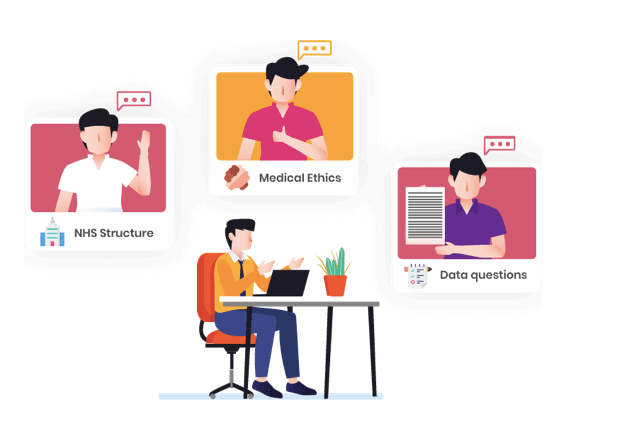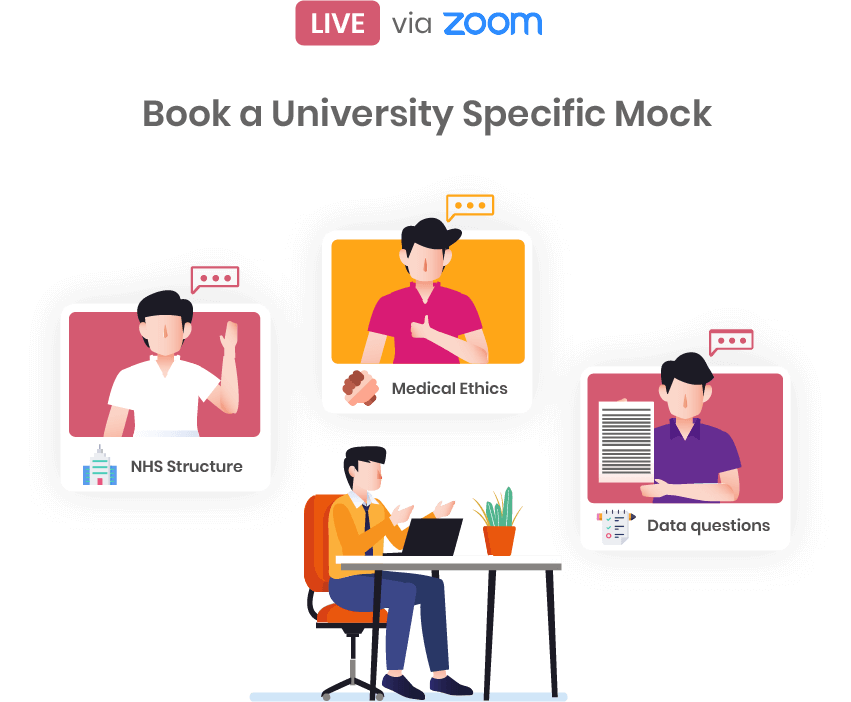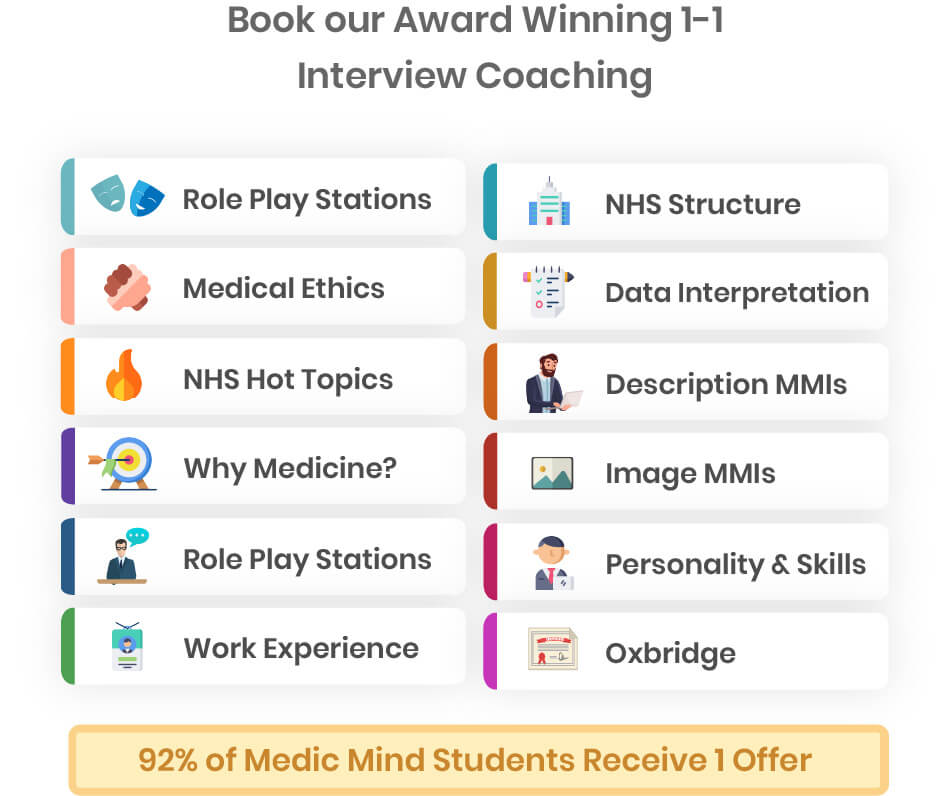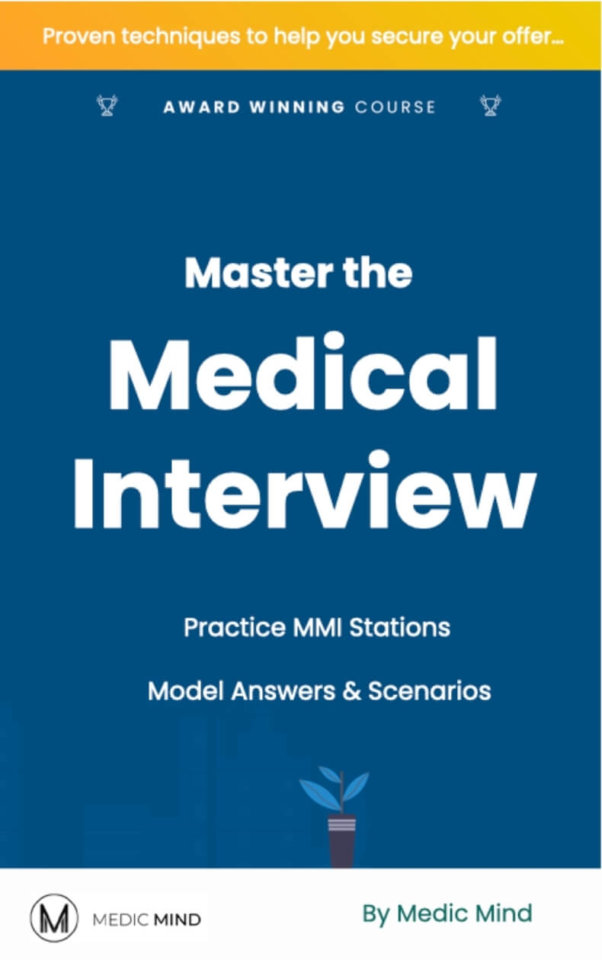Loading...


Birmingham University Medicine Interview Questions
This article was updated in December 2023 with the latest information, and we will continue to regularly update it!
Birmingham’s five-year Medicine programme allows students the opportunity to experience hands-on learning that teaches practical, communication and theoretical skills needed to become a doctor.

In this guide we provide an expert insight into past University of Birmingham MMI stations, the University of Birmingham interview day and tips for converting your University of Birmingham interview into an offer!

How Is Birmingham Interviewing for 2024 Entry?
What is the Birmingham interview style?
The Birmingham Medicine Interview is currently planned to be in-person for 2023/24 entry. It will involve 6 or 7 interview stations including a roleplay station, which will last for around 8 minutes. You will have 2 minutes preparation time where you’ll be told the discussion topic and questions you need to answer. One station will tackle dealing with personal and ethical challenges and the role play station will involve having a conversation around substance issues. There may also be a calculation station test, you will have 8 minutes to complete the task and this will happen on a different date to your interview.
What are the Birmingham Interview Dates?
Interviews are expected to be held in January and February.
Meet Our Birmingham Tutors!
What are the common topics covered at Birmingham?
- Debate a medical hot topic
- Qualities needed to be a doctor
- Medical ethics
- Personal strengths and weaknesses
- Data interpretation
- Communication – role play station
- Dealing with personal and ethical issues
How many people interviewed at Birmingham?
Last year, there were 2829 applications and 1146 interviews.
How many interviewed applicants received an offer from Birmingham?
Out of the 1146 interviews, 840 offers were made.
At Medic Mind we’ve helped many students secure offers from Birmingham and other medical schools. If you’re applying to Birmingham, we can do a high quality 1-1 mock with you with a Birmingham tutor and realistic stations uniquely for Birmingham.
Book a University Specific Mock
Meet our Tutors from Birmingham

List of Recent University of Birmingham MMI Stations
| Theme | Birmingham Example Questions |
|---|---|
| Motivation for Medicine | Interest in current health news Why medicine? |
| Work Experience | Discussing work experience |
| Communication & Role-Play | Role play in various hospital and GP settings Debating NHS hot topics General communication with students/doctors Breaking bad news Consoling patients Reflection on personal qualities |
| Personality & Skills | UCAT style maths station Data interpretation of charts/graphs Important qualities in medicine Resilience Learning from mistakes |
| NHS Hot Topics | Sugar/alcohol tax Organ donation Substance abuse Legal highs Paying for certain NHS services Minimum unit pricing |
| Medical Ethics | Prioritising which patients receive organ donations Scenario involving dishonesty |
| Personal Statement | No focus on personal statement |
If you wish to practice Birmingham mocks, here are some sample questions:
- What is a recent news article you have read?
- What did you learn from your work experience?
- Describe an interesting patient from your work experience?
- Speak to an actor, who has come into the GP practice to discuss his low mood over the past 3 months
- Speak to a fellow student, who believes the NHS should not provide treatment to smokers
- Speak to an actor, who is a patient. Explain to the patient that they unfortunately have been diagnosed with cancer, and offer support.
- Describe a time where you made a mistake. How did you feel?
- Read this article on the proposed sugar tax. What are your thoughts?
- Should organ donation be opt-in or opt-out in the UK?
- A friend of yours has repeatedly missed university due to “illness”. On Instagram, you see them away on a party holiday in Toulouse, meaning they have missed hospital clinics for 1 week. What do you do?
To prepare for your Birmingham MMI interview, may wish to check out our guide to approaching MMI role plays
A Birmingham Medical Student’s Perspective
Name 3 Reasons why you picked Birmingham
- Reason 1 – Birmingham was the first university I went to for an open day. I was impressed by the beauty of the campus and the opportunities to get involved not only in groundbreaking research but within the MedSoc, catering to a wide variety of interests and sports. Furthermore, the facilities on campus are great, with great places to study, eat and meet people and I’m a huge fan of the impressive new gym.
- Reason 2 – I wanted to study in a city yet still retain campus life. Birmingham is a great city for culture, entertainment and art, bustling with new events and great nightlife. Having studied here for 2 years, Birmingham never fail to impress me, being such a big city with new corners and new events to explore all the time!
- Reason 3 – Birmingham’s teaching style is somewhat traditional (2 years pre-clinical, 3 years clinical) but with aspects of CBL and PBL integrated within the course. This means I could adapt very easily to how I was taught subjects at school, while giving us clinical practice to apply and test our knowledge. Birmingham also teaches anatomy through prosecution, which I personally enjoy because it illustrates anatomical structures and systems clearly and it removes pressure of having to dissect your own cadaver.
What makes Birmingham unique to other medical schools?
Birmingham is in the close proximity of the QE Hospital, which provides an exciting teaching experience and a range of revolutionary procedures and treatments. Furthermore, the transport links from the university are great, having a train station on campus which is easily accessible to the entire West Midlands and placements. Our MedSoc has often been rated one of the best in the country, offering one of the widest sets of societies, meaning there are new opportunities to get involved in any new or existing interests, regardless of how familiar you are with them. In addition, many societies are centered around specialties, allowing students to take part and learn more about medical specialties they take interest in. This means students can hone their interests and explore career options early, and that we are more likely to know which specialties we’d like to place in during foundation years.
Insider Guide: University of Birmingham Interview Day
How did the University of Birmingham Interview day work?
It will involve 7 or 8 interview stations. There will be two interviewers present plus a possible observer may be present but not participate in the interview. One station covers dealing with personal and ethical challenges, where you’ll be given a scenario relating to possible challenges a medical student or doctor could face and how you would tackle it. The role play station will involve having a short conversation around a substance issue with a role player and give appropriate advice.
What was the dress code for the University of Birmingham Interview?
Something smart but comfortable.
How did you receive information for each University of Birmingham station?
There is a 2-minute preparation time, where you will be given information on what the station involves.
What were the University of Birmingham examiners like?
Some were friendly, but most were slightly cold. Some would shut down all the ideas I put across, so I think there was definitely some assessment of how applicants dealt with this stress. The MMI examiners also gave us a 1 minute warning towards the end of each station.
Did the University of Birmingham interviewers ask a lot of follow up questions?
There were a lot of follow up questions with some multiple set questions. This was good as it meant the conversation would use up all the allotted time. Some were unexpected questions, but they were all linked to the initial question.
How is my interview score used at University of Birmingham?
Your interview score will be added to your calculation station score and UCAT SJT result. Your interview score counts for 50% of this score.
How long did it take you to hear back after your interview?
I heard back one month after my Birmingham medicine interview, but you may have a longer or shorter wait. We also received feedback from the interview after hearing if we got a place.

Top Tips for University of Birmingham Medicine MMI Interview
1. Do your research on Birmingham medical school. Make sure you have looked at the University of Birmingham Medicine MMI Interview website. The website includes statistics, preparation information, MMI station hints and an explanation of how applicants are scored.
2. Don’t get disheartened if they grill you! Do not be put off by the interviewers if they seem uninterested whilst you are talking or appear to dislike your answer. This is often just to put you off and see how you cope. Try your best to stay level headed.
3. Read the MMI instructions carefully. Read quickly outside the station and try to retain as much of it as you can. You do not want to enter the station and forget what it is about.
4. Know the NHS Hot Topics. The University of Birmingham recommends keeping on top of current medical issues and discussing and debating them with friends or family as preparation for your Medicine MMI interview. We have a great page here for NHS Hot Topics.
5. Specific examples are incredibly useful! Have a couple for each important skill you would like to mention, each news article you have read and your work experience
6. Stay calm. Many of the interviewers are friendly and will make an effort to make the interview as comfortable as possible for applicants. They all want to see you perform at your best and want to get the best idea of you they can. Personality is a big factor for Birmingham, as they look for well-rounded, compassionate and motivated individuals who would flourish into great doctors.
7. Read up on NHS hot topics and develop an argument for how you feel about many of them. It doesn’t necessarily matter how you feel about most topics, but your reasoning will stand out as long as long as you can back up your argument with well-researched and reasonable answers. You should aim to benefit the majority of patients and the NHS together, taking into account costs, availability and quality of life for patients involved. While they will not ask for solutions to many of the problems’ affecting the NHS (as you are not expected to fix them yourself) it will always be useful to acknowledge that many of these are difficult, multi-faceted issues and thus try to address them from all standpoints (e.g. from the view of doctors, nurses, healthcare staff and patients).
8. Brush up on mental maths skills. The maths stations at Birmingham can be daunting for many people as they assume they will need a vast knowledge of mathematics and a lot of practice. All calculations require nothing more than a basic GCSE knowledge of maths, and although time pressure can be a key factor, adequate time is provided during the station to allow students to work through each question and check their answers. Most questions are related to drug calculations and figures are easily provided, however since subsequent questions are based on previous question answers, getting just one of them wrong could cost you a series of other questions.
Covid – 2024 Changes
Is the University of Birmingham MMI Interview different this year?
The interviews will be held face to face for 2024 entry.
Where can I find more information about the changes?
Full details of the changes can be found here 2024 entry interviews
Book a University Specific Mock
Meet our Tutors from Birmingham


Frequently Asked Question
→What is the Birmingham University Medicine Interview?
The Birmingham University Medicine Interview is an essential part of the application process for the Medicine course at the University of Birmingham. It aims to assess the candidate’s suitability for the course and their potential to become a successful medical practitioner.
→What types of questions are asked during the Birmingham University Medicine Interview?
The Birmingham University Medicine Interview includes a range of questions that assess the candidate’s knowledge, skills, and personal attributes. The questions may cover topics such as motivation for studying Medicine, ethical and moral issues, teamwork, problem-solving, communication, and critical thinking.
→How long does the Birmingham University Medicine Interview last?
The Birmingham University Medicine Interview typically lasts around 30-45 minutes, but the exact duration may vary depending on the candidate’s responses and the interviewer’s approach.
→What is the format of the Birmingham University Medicine Interview?
The Birmingham University Medicine Interview format may vary, but it is usually an MMI.
→How hard is it to get into Birmingham University medicine?
Getting into Birmingham University medicine is highly competitive, and the admissions process is rigorous. The university receives a large number of applications every year, and the selection criteria are based on academic excellence, relevant experience, personal attributes, and performance in the Birmingham University Medicine Interview. Therefore, it can be challenging to get accepted into the Medicine course at Birmingham University, and candidates must demonstrate a high level of academic achievement, relevant work experience, and exceptional communication skills to be successful. The exact level of difficulty may vary depending on the applicant’s qualifications, experience, and the competitiveness of the applicant pool in a given year.
→How can I prepare for the Birmingham University Medicine Interview?
To prepare for the Birmingham University Medicine Interview, you can practise answering sample questions, research the course and the university, and familiarise yourself with the medical profession’s ethical and moral issues. You can also seek advice from professionals, such as doctors or medical students, and attend mock interviews.





Was this article helpful?
Still got a question? Leave a comment
Leave a comment